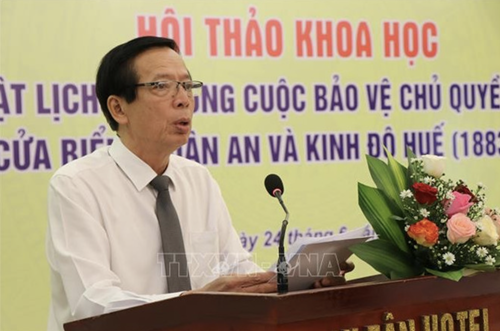Dr. Phan Tien Dung, Chairman of the association, noted that from the mid-19th century, when the French colonialists began their invasion of Vietnam, they encountered strong resistance from both the people and the royal army of the Nguyen Dynasty (1802–1945). Despite this fierce opposition, France gradually seized control of key areas before launching a decisive attack on the nation’s political center then, the Hue Imperial Capital, between 1883 and 1885. Throughout this heroic period, many figures, historic sites, and events embodied the spirit of patriotism, sacrifice, and resolve in safeguarding national sovereignty.
    |
 |
|
Phan Tien Dung, Chairman of the Hue Association of Historical Science, speaks at the event. |
Experts and scholars at the workshop examined the strategic role of the Thuan An Estuary and its defenze system in protecting the capital against French assaults. They also discussed internal developments within the Nguyen Dynasty during the Franco-Spanish coalition’s campaigns, particularly the tension between pro-war and pro-peace factions, and their impact on the political and military situation at that time.
Additionally, participants highlighted the role of local communities in the resistance, especially in self-defenze, logistical support, and solidarity. They also discussed cultural traditions and folk practices such as ritual offerings to honor those who fell after the capital was lost.
Several delegates compared and analyzed historical records from Vietnam and other countries to provide a more objective view of the battles and events at Thuan An and the capital from 1883 to 1885. They also proposed recognizing several sites as historical relics and intangible cultural heritage, and erecting commemorative steles to honor this pivotal chapter in Vietnam’s history.
    |
 |
|
The workshop is held by the Hue Association of Historical Science on June 24. |
Reflecting on the period, Nguyen Anh Tuan of the Hue Association of Historical Science noted that after King Tu Duc’s death in July 1883, the Nguyen Dynasty was plunged into a political crisis. The rise and fierce opposition between pro-war and pro-peace factions revealed deep strategic and leadership shortcomings while a colonial force was continuously expanding its influence in the region
According to Tuan, these divisions reflected an inevitable confrontation between a traditional monarchy and the new challenges posed by the Western colonialism — a sign of a political crisis and the comprehensive weakening of the feudal regime in Vietnam.
Source: VNA